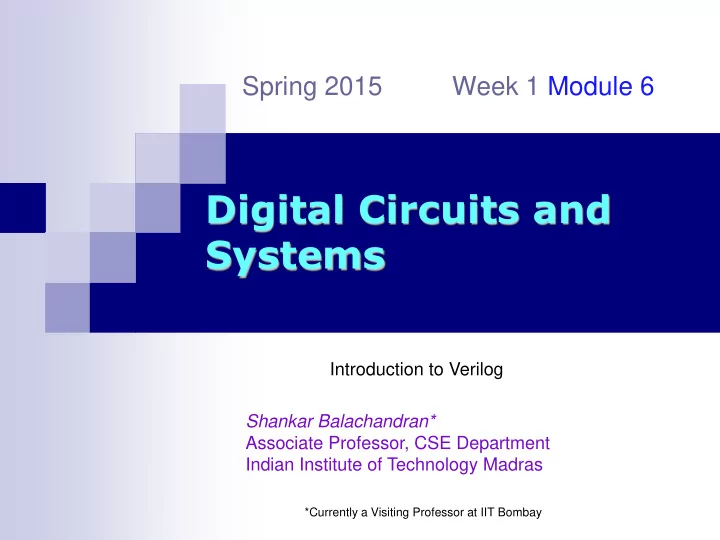

Spring 2015 Week 1 Module 6 Digital Circuits and Systems Introduction to Verilog Shankar Balachandran* Associate Professor, CSE Department Indian Institute of Technology Madras *Currently a Visiting Professor at IIT Bombay
Abstraction Levels Adder System Level Shifter Architecture Level Gate Level Transistor Level Silicon Level Introduction to Verilog 2
Design Representation (Example 1) Multiplexer : Choose one of two inputs based on a control input Sel : Select line and is a control input A,B : Data Inputs Out : Multiplexer Output A Out MUX B Sel Introduction to Verilog 3
Textual Description A Out MUX B Sel If Sel is `0’, choose A and pass it on to Out If Sel is `1’, choose B and pass it on to Out The value of A and B does not matter Pass both 0’s and 1’s Introduction to Verilog 4
Truth Table Sel A B Out 0 0 0 0 0 0 1 0 0 1 0 1 0 1 1 1 1 0 0 0 1 0 1 1 Boolean Equation 1 1 0 0 1 1 1 1 O t u Sel A S l e B Introduction to Verilog 5
Gate Level Description A tmp0 Selbar Sel Out tmp1 B Introduction to Verilog 6
Verilog Description (Netlist) module multiplexer (A, B, Sel, Out); input A, B, Sel; output Out; A tmp0 wire tmp1, tmp0; selbar Sel wire selbar; Out B and (tmp1, B, Sel); tmp1 not (selbar, Sel); and (tmp0, A, selbar); or (out, tmp0, tmp1); endmodule Introduction to Verilog 7
What is Verilog? Verilog is a Hardware Description Language (HDL) HDL: A high level programming language used to model hardware. Hardware Description Languages have special hardware related constructs. currently model digital systems and limited analog, and in future can model complete mixed-signal systems also. can be used to build models for simulation, synthesis and test. have been extended to the system design level Introduction to Verilog 8
Verilog Language Concurrent hardware description language Naturally expresses parallelism in the hardware Has constructs in it for modeling delays Similarities in syntax to software languages Introduction to Verilog 9
End of Week 1: Module 6 Thank You Introduction to Verilog 10
Recommend
More recommend